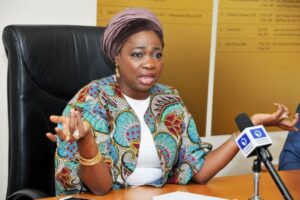Debt profile: FG to finance budget deficit with new borrowings
…As experts predict Nigeria’s bankruptcy before end of Q4
Abimbola Abatta, Ariemu Ogaga and Matthew Denis
Nigeria’s debt profile is expected to worsen as the Federal Government concluded plans to finance an increase in the 2022 budget deficit through new borrowings.
President Muhammadu Buhari, in a letter to the House of Representatives, sought the approval for a fresh loan to finance the budget deficit.
In the letter, which was read by the Speaker, Femi Gbajabiamila, on Thursday during plenary, the President requested for the review of the 2022 Medium-Term Expenditure Framework (MTEF) upon which the budget was hinged.
The development is sequel to the schedule of the Federal Government’s N720 billion domestic borrowing plan for the second quarter of 2022 recently released by the Debt Management Office (DMO).
The country’s debt profile, which was put at N39.55 trillion as at December last year, has continued to raise serious concerns among Nigerians.
President Buhari, in the letter, said, “As you are aware Mr Speaker, the new development both in the global economy as well as the domestic economy has necessitated the revision of the 2022 fiscal framework on which the 2022 budget was based.
“The total budget deficit is projected to increase from N965.42 billion to N7.35 trillion representing 3.99 percent of the GDP.
“The increment of the deficit will be financed by new borrowings from the domestic market.
“Given the urgency of the request for revision of the 2022 fiscal framework and 2022 budget amendment, I seek the corporation of the National Assembly for expeditious action on this request.’’
After reading the letter, the Speaker referred it to the House Committee on Finance for further legislative action.
Experts predict Nigeria’s bankruptcy before end of Q4
While speaking with our Correspondent on the development, an Economist, the Chief Executive Officer (CEO), Centre for the Promotion of Private Enterprise (CPPE) and
Former Director General, Lagos Chambers of Commerce and Industry (LCCI), Dr Muda Yusuf, reiterated that the rising debt profile of the government raises serious sustainability concerns.
He noted that it is imperative for the government to downscale the size of governance
In his words, “The Debt Management Office had reported that total public debt was N39.56 trillion as at December 2021. 11.3% of this debt is owed by the states and FCT.
“However, when we take account of borrowings from the CBN and the stock of AMCON debt, the debt profile would be in excess of N50 trillion.
“Although the government tends to argue that the condition was not a debt problem, but a revenue challenge. But debt, typically, becomes a problem if the revenue base is not strong enough to service the debt sustainably. It thus becomes a debt problem.
“Government’s actual revenue can hardly cover recurrent budgets. Which implies that the entire capital budget and part of recurrent budget would be being funded from borrowing. This is surely not sustainable.
“We cannot continue to increase borrowing on account of the relatively low Debt/GDP ratio. We do not service debt with GDP, but with revenue. Close to 40% of our GDP does not contribute appreciably to revenue.
“We need the political will to cut expenditure and undertake reforms that could scale down the size of government, reduce governance cost, ease the fiscal burden on government and boost revenue.
“It is important to ensure that the debt is used strictly to fund capital projects, especially infrastructure projects, that would strengthen the productive capacity of the economy. Additionally, emphasis should be on concessionary financing, as opposed to commercial debts which are typically very costly.
“It is imperative for the country to operate as a true federation which it claims to be. The unitary character of the country is making it difficult to unlock the economic potentials of the subnational. It is perpetuating the culture of dependence on the federal government.
“It is necessary to scale down the size of government and cost of governance. We should note that fiscal sustainability is driven by both cost and revenue. Therefore, managing the major drivers of cost and revenue is imperative.
“As far as possible, the government should push back in sectors or activity areas where the private sector has capacity to deliver desired outcomes. We should see more concessioning and privatisation at all levels of government. This would allow for the infusion of more private capital into the infrastructure space,” he said.
On his part, the Managing Partner, BBH Consulting, Barr. Ameh Madaki, said the new spate of borrowing by the Federal Government will further compound Nigeria’s economic woes.
Madaki said, “The new spate of borrowings further compounds Nigeria’s economic woes. With dwindling revenues and an all time high rate of crude oil theft, coupled with increased subsidy payments for PMS, it will be a miracle if the country is not bankrupt by year end.
“Several analysts have warned that borrowing for consumption is not sustainable in the short and long term, but it appears that none of such advice means anything to this government anymore,” he added.
In his reaction, the Lead Strategist of Nigerian Workforce Strategy and Enlightenment Centre (NIWOSEC), Dr. David Kayode Ehindero, frowned at President Buhari-led administration on the continuous borrowing to finance the 2022 budget.
Dr. Ehindero appealed to the House of Representatives to ignore the request by the presidency, considering the fact that Nigeria’s debt profile is over $40billion in this second quarter of the season.
He called on the Government to cut down the salaries of political appointees by 50 per cent and inject the amount into the capital budget as a way of minimising excesses.
He explained that, “The politicians should reflect on the economy starting from the President, thereby sacrificing 50 percent of their salaries and to avoid some peripheral attachments.”
According to him, an increase in deficit signifies a bad economy for the country.
Consequently, the Government should collaborate with stakeholders to harness abundant mineral resources across the country.
The NIWOSEC boss suggested that the government should shun the attitude of seeking loans but should rather internalise its oars on revenue-generating agricultural produce to boost the exporting sector of the economy.




